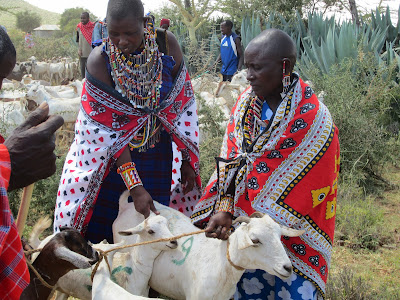Change is in the air. The Maasai people, traditionally a semi-nomadic group, have been encouraged by the governments of Kenya and Tanzania to take on a more sedentary lifestyle. Work has been done to develop agricultural skills, specifically in the growing of a variety of crops.
Our day started off with a visit to the MIDI (Maasai Integrated Development Initiative) offices. Here we met with their staff prior to heading out to the field to engage in three projects currently being undertaken.
MIDI works with self-help community groups that are made up mostly of women. On this day they were harvesting and thrashing beans. How wonderful to witness people working together, helping each other with the harvesting of their crops.
They also showed us some of the potatoes that they had been growing.
And of course no visit to the Maasai is complete without being given the opportunity to also purchase some of their handicrafts/beadwork.
From here it was onwards down the Rift Valley, over dusty and rocky roads, to a place where goats were found bleating in their thorn fenced pen.
This project is the result of a growing awareness that simply working with relief aid help might not be good enough. Every time another drought hits, people can lose most of their herds – at times even as much as 80%. Food for work programs had been initiated, but it seemed like every crisis simply meant the need for another round of relief. What could be done to help curb this ongoing need and rather work towards more sustainability? With this question in mind, the self-help group decided to try a goat restocking project. Goats have some real advantages over cattle. First off, they will become the woman’s property, and second, their survival rates during periods of drought are much higher than cattle. Maintaining goat herds will help supply them with milk needed to survive times of crisis.
When we arrived at the place where the goat distribution was to take place, we found the self-help group waiting for us under the shade of the acacia tree. There were 102 in this self-help group of which 90 were women. The goats were not entirely a gift, but rather the self-help group had collected funds to pay part of the purchase price. For the first goat they would pay 10% and that would increase so that by the time they received their fifth goat it would be 20%. In today’s distribution, each would receive their first two goats.
The process for the goat distribution was done by lottery. Each of the goats was numbered. There were two numbered “1”, another two numbered “2”, and so on. When they drew their number, the goats they would receive was set. There was no need for any rush or hysteria. It was all well-organized. Their investment in the project was crucial to its success.
One of the things that really impacted me was when one of our tour participants asked the question “How many of them can read and write?” The responses to the translation showed only three of the 102 hands go up. The follow-up question was “How many of you have your children going to school?” For this, all the hands went up. Change is definitely in the air for the Maasai. The education of their children will help their communities change. Knowledge multiplies the tools available. Learning to read and write will help them learn about sustainable methods of agriculture as well as the causes and prevention of HIV/AIDS. Growing a variety of crops and working with animals that can withstand the harsh conditions they experience will help them survive in their new social structures.
From here we headed off to a beading workshop where they make jewellery for export, including Ten Thousand Villages. It was remarkable stuff, and in buying from them we knew that we were helping them pay their children's school fees.
And then it was down those same roads one more time, back to the Mennonite Guest House where we would debrief our experiences in the evening. We were shaken and tired, dusty and overwhelmed again.








No comments:
Post a Comment